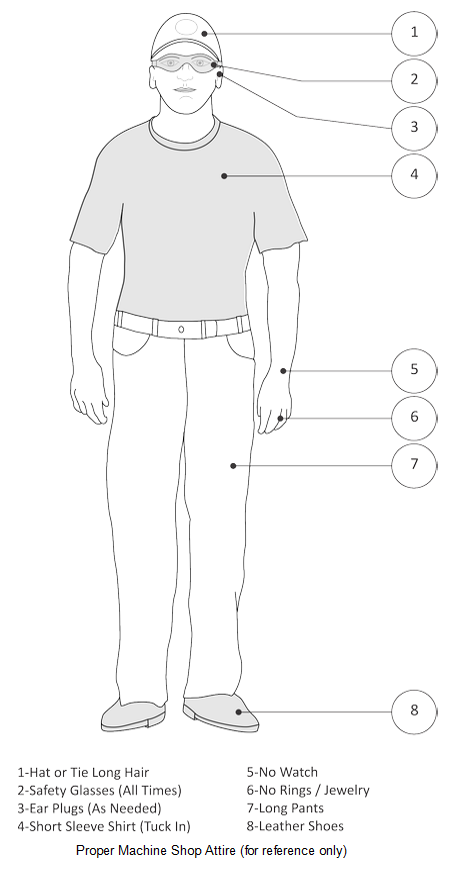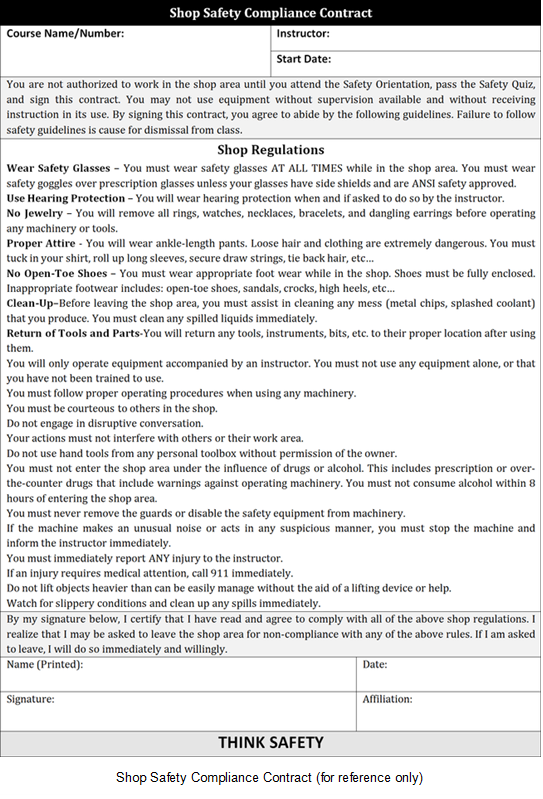Shop Safety
1. Safety Awareness
Most machinists go their entire career with no serious injury even though they work with many different machines that expose them to risks. Machinists are, by nature and training, careful and methodical. They learn from experience an attitude of safety awareness and respect for equipment. Knowing that ignorance can hurt you is essential to cultivating an attitude of safety.
It is true that CNC machines are generally safer than manual machine tools. They are usually completely enclosed, which reduces the risk of flying chips, debris from broken tools, or contact with a spinning tool. Yet machine shops are inherently dangerous places that are unforgiving of any carelessness, ignorance, or neglect.
Cutting tools, and the chips they produce, are sharp. Chips ejected from the machine can cause eye injuries. CNC machines can move over one foot in less than a second. Any physical contact with a spinning tool will result in serious cuts or worse. Remember, if it can cut metal it can cut skin and bone just as easily.
Here are some examples where a failure to know or apply shop safety rules caused injury:
A person forgets to wear safety glasses and sustains an eye injury from a metal chip thrown over the top cover of a CNC mill as they walk through the shop.
A person leans against a bench where a cutting chip has fallen, resulting in a cut to their hand.
A person wearing open sandal shoes has a chip fall between their foot and shoe, causing a cut.
A person leaning over a machine suddenly raises their head and bumps into a tool stored in the tool changer, causing a severe cut.
A person reaches into the machine to remove a part, gets distracted and rakes their arm against an end mill.
A person grinds a piece of aluminum on a bench grinder with a stone type wheel. The aluminum embeds in the porous wheel and expands due to heating, causing the wheel to fail and throw off fragments at high speed.
2. Personal Conduct & Shop Etiquette
It is important to follow strict of rules of personal conduct and etiquette in the shop. This will keep you and your peers safe and promote a hospitable and professional environment:
Know where your hands are at all times.
Move deliberately and always look where your hands are going.
Always be aware of what could happen if your hand slips. For example, when tightening a bolt, think about what would happen if the wrench slipped. Would your hand or arm contact a tool? A pile of sharp chips?
Always be aware of what could happen if you slipped and lost your footing. Would your center of gravity cause you to fall into a sharp tool or other hazard?
No horseplay or practical jokes are allowed in the shop.
Be considerate. Do not engage in loud or unnecessarily talk.
Do not interrupt someone working at the machine. This could cause them to make a mistake.
Never borrow tools from a private tool box without first asking the owner. If they refuse, accept it graciously.
Respect professional Machinists. There is much you can learn from them.
Do not make unreasonable demands ("I need it yesterday" etc.).
Clean up after yourself. Leave the machine and surrounding area at least as clean as you found it.
Always put tools and equipment where you found them.
3. Shop Clothing
Follow these rules of personal dress for the shop:
Wear ANSI approved safety glasses or ANSI safety approved glasses with side shields. You must wear safety glasses at all times in the shop, not just when at the machine.
If machining operations are loud, use hearing protection.
Do not wear flip flops or sandals. Leather shoes are best. Steel toe shoes are not necessary unless handling heavy objects that would crush regular shoes.
Do not wear long sleeve shirts because these could get caught in equipment. Wear short sleeves or T-shirts.
Remove rings and watches when at the machine.
Do not wear short pants. Wear sturdy long pants like blue jeans or work pants.
Long hair should be tied back or under a hat to prevent it being caught in the machine spindle.
Never wear gloves as they can be caught in the machine. Latex gloves are acceptable.


4. General Safety Practices
Rules for a safe workplace:
Never use any equipment which you have not been trained to operate by a qualified person.
Never tamper with a machine safety guard or switch.
Get into the habit of constantly tidying the workspace. A clean workplace is safer. Random metal can not only scratch and ruin finished parts, they can cause severe cuts.
Use caution when handling cutting tools. They are very sharp. Never handle a tool by its cutting flutes.
Never start or jog the machine until you have checked that the work area is clear.
Never push the start button on the machine unless you are certain your setup is capable of safely holding the part against all cutting forces during machining.
Use caution when running a new program: especially at the start of program and after a tool change.
Know where the emergency stop is on the machine and practice using it before you need it.
Never run a machine alone or without other people within hearing distance.
When working with someone else at the machine, clearly communicate who is running the machine.
Never have one person touching the control while the other is working in the machine envelope.
Use a paint brush to sweep away sharp chips. Never use your hands or a rag.
Never use an air hose to clear chips from a machine. Flying chips are dangerous to you and others.
Liquids spills are slipping hazards. Clean spills immediately.
Dirty or oily rags must be stored in a fireproof canister. These can spontaneous combust and cause a fire.
Lift with your legs, not your back.
Never lift anything more than you can comfortably handle.
Get help handling heavy or bulky objects.
At the end of the program, command the machine to position the part close to the operator so it can be easily reached without leaning far into the CNC machine.
Never leave a running machine untended.
Before shutting the machine down, remove any tools from the spindle.
Avoid contact with coolant. Water-based coolant contains microbes that can cause infection.
Immediately treat and cover even minor cuts.
Report any injuries immediately.
Remain alert. Think safety in everything you do.
5. CNC Safety Practices
Use these extra precautions when running a CNC program for the first time:
Use machine Rapid and Feed override controls to slow the machine down.
A major cause of crashes is setting the tool or fixture offset incorrectly. Pay particular attention to moves at the start of program and immediately after a tool change as the tool moves towards the part. Use single-block mode to advance through the program one line at a time until the tool is at cutting depth.
Remain at the machine with a hand on or near the emergency stop button.
Stop machine motion at the first sign of trouble.
6. Safety Contract
Training facilities should require everyone to pass a safety quiz and sign a safety contract before allowing work in the shop. The safety contract makes clear the obligations and operating regulations of the facility. Failure to abide by the terms of the contract is cause for dismissal from the shop. An example safety contract is shown on the facing page.
*** Warnings
What you don't know CAN hurt you.
Never operate a machine that you have not been properly trained to use by a qualified person.
Read the machine operator manuals and follow all safety instructions.
THINK SAFETY FIRST in all you do.


